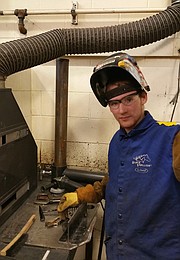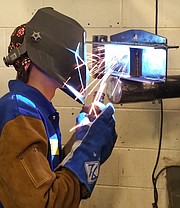Libby students test welding skills at competition at Flathead Valley Community College in Kalispell
The two students from Libby High School who competed in the Flathead Valley Community College’s Welding Competition may not have won, but they came away with valuable experience, said Libby Industrial Arts teacher John Love.
The top two welders in the competition were awarded scholarships through FVCC, as well as a welding helmet, jacket and gloves. Third place won a welding helmet.
The rest of the field were not ranked, Love said. However, both of the Libby students — Michael Diller and Jonathan White — finished all their welds, which not all participants managed to do in the time allotted.
“I’m Proud of these kids. They did a great job,” Love said.
The competition piece had to be welded to the bench, and then the students had to complete a variety of welds in place, Love said.
Because of where they are in their classes, neither Diller nor White had experience with an overhead weld, which was needed to complete the piece, he said. But, with a little coaching, both students were able to complete the piece.
“They were able to adapt, and it really gave them a reality of what’s expected of them when they walk out the door with those certificates in hand,” Love said.
“I guess I just grabbed some metal and started trying it,” White said of approaching the overhead weld. “I actually had pretty good confidence in it. I felt pretty good about my skills.”
Love said that some students in the competition had practiced with mock ups of the competition piece. Yet, he didn’t want his students to approach the competition like that.
The real world won’t hand them tailor-made work, he said. He wants them to know how to do the welds where they are needed, not just how to complete a specific piece.
“My goal is to produce successful welders that are competent in the real world,” Love said.
“Each situation is going to be different,” Love said. “If they take this on as a profession, they are either going to cost themselves a lot of money, or make themselves a lot of money.”
As a junior, White is in his second year of studying welding at Libby High School. He is already putting that experience to work at his after-school job at Kootenai Disposal.
White said he first took an interest in welding because he has a sister-in-law who does it for a living.
“She seemed to have fun with it, so I just started taking the class, and I really started liking it,” he said.
“It’s almost like an art form. It’s calming. There’s different patterns you have to do,” White said. “I don’t know, it’s kind of like art.”
The Libby students who take welding are dual enrolled at FVCC and get college credits, Love said. The first two semesters cover six credit hours, all of which are offered by FVCC for free.
Peter Fusaro, trades and industrial arts director at FVCC, said that each of the instructors at the high schools that participate in their dual credit program are certified as college instructors through FVCC as well.
“They teach pretty much the exact same class that we teach at the college,” Fusaro said.
When students complete their qualification test at the end of the second semester, they will be certified with industry-recognized credentials, he said. From there, they can continue on to more advanced college training, or they can move directly into working as a welder.
In addition to the jobs and further education that exist for vocational fields, there are also opportunities to do apprenticeships, Fusaro said. Such programs allow students to work as they learn, and many employers will help to pay for additional education as well.
The school also helps students out by providing them with an OSHA 10 certification, said Libby Middle/High School Principal Ruth Rogers. The certification is required for insurance, and having it helps to make Libby students that much more attractive as employees.
In addition to the pride he takes in the industrial arts programming at Libby High School, Love said he is also proud of his fellow instructors and a community that supports them.
“My colleagues that I work with do a really, really good job of walking these students — that’s Bruce Fuller and Mort Curtiss — they do a good job of giving them a strong foundation to build from,” he said.
But none of it would be possible without a school administration that recognizes the value of a true trades education program, and a community that is willing to invest in it, he said.
In some schools, shop class can become a dumping ground for students no one wants anywhere else, Love said. At Libby, whether it’s welding, automotive repair, wood working or working with sheet metal, the students are actually learning true vocational skills.





